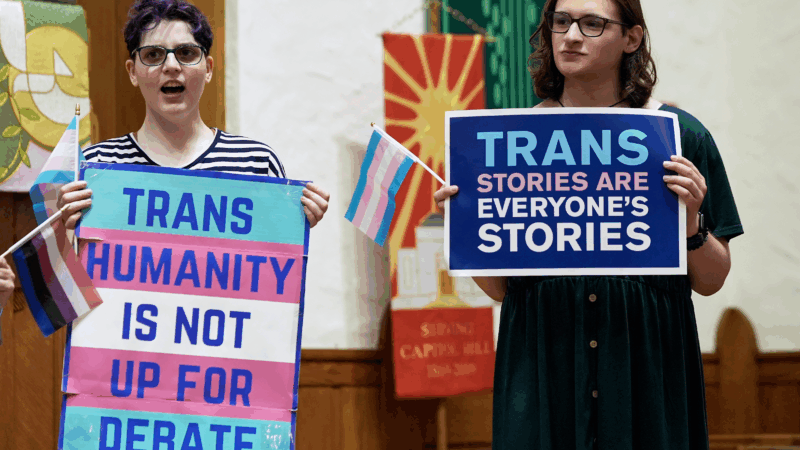Does Georgia’s fetal ‘personhood’ law mean a pregnant woman must stay on life support?
By the time she ended up at a Georgia hospital with emergency complications, 30-year-old Atlanta nurse Adriana Smith was almost nine weeks pregnant.
Her condition, which included multiple blood clots, deteriorated as doctors tried to save her life, Smith’s mother April Newkirk told Atlanta TV station WXIA.
“They did a CT scan and she had blood clots all in her head. So they had asked me if they could do a procedure to relieve them, and I said yes,” Newkirk said. “And then they called me back and said that they couldn’t do it.”
She said doctors declared Smith ‘brain dead’ and put her on life support without consulting her.
“It’s torture for me,” Newkirk said. “I come here and I see my daughter breathing by the ventilator, but she’s not there.”
That was more than three months ago. Smith is still pregnant.
“And I’m not saying that we would have chose to terminate her pregnancy,” Newkirk said, “but what I’m saying is we should have had a choice.”
Except for an emailed statement, Emory Healthcare isn’t commenting on the case.
“Emory Healthcare uses consensus from clinical experts, medical literature, and legal guidance to support our providers as they make individualized treatment recommendations in compliance with Georgia’s abortion laws and all other applicable laws,” the statement said. “Our top priorities continue to be the safety and wellbeing of the patients we serve.”
Georgia’s law H.B. 481, also known as the LIFE Act, passed in 2019. It went into effect shortly after the U.S. Supreme Court overturned Roe v. Wade with its Dobbs ruling on June 24, 2022.
The law bans abortion after the point at which an ultrasound can detect cardiac activity in an embryo. Typically this is about six weeks into pregnancy.
It also gives Smith’s fetus the same rights as a person. The law says “unborn children are a class of living, distinct persons” and explains that the state of Georgia recognizes “the benefits of providing full legal recognition to an unborn child.”
Did fetal ‘personhood’ mean life support was required?
Twenty states now ban abortion at or before 18 weeks’ gestation; 13 of those have a near-total ban on all abortions with very limited exceptions, according to the Guttmacher Institute, a nonpartisan research group that supports abortion rights.
Like Georgia, some of these states built their abortion restrictions around the legal concept of ‘personhood,’ thus conferring legal rights and protections on an embryo or fetus during pregnancy.
Smith’s case represents a major test of how this type of law will be applied in certain medical situations. Despite being unified in their opposition to abortion, conservatives and politicians do not always agree on the scope of the law in cases like Smith’s.
For example, Georgia’s Republican Attorney General Chris Carr doesn’t think the law restricts the options in Smith’s care, so removing her from life support wouldn’t be equivalent to aborting the fetus.
“There is nothing in the LIFE Act that requires medical professionals to keep a woman on life support after brain death. Removing life support is not an action ‘with the purpose to terminate a pregnancy,'” Carr said in a statement.
But Republican Georgia state Sen. Ed Setzler, who authored the LIFE Act, disagrees. Emory’s doctors acted appropriately when they put Smith on life support, he told the Associated Press.
“I think it is completely appropriate that the hospital do what they can to save the life of the child,” Setzler told the AP. “I think this is an unusual circumstance, but I think it highlights the value of innocent human life. I think the hospital is acting appropriately.”
Personhood energizes anti-abortion movement
“The problem is that Georgia’s law isn’t just an abortion ban, it’s a ‘personhood’ law declaring that a fetus or embryo is a person, that an ‘unborn child,’ as the law puts it, is a person,” said Mary Ziegler, a law professor at the University of California-Davis and author of “Personhood: The New Civil War over Reproduction.”
The legal concept of “personhood” has implications beyond abortion care, such as the regulation of fertility treatment, or the potential criminalization of pregnancy complications like stillbirth and miscarriage.
In Georgia’s law, extending rights of personhood to a fetus changes how child support is calculated. It also allows an embryo or fetus to be claimed as a dependent on state taxes.
But the idea of personhood is not new, Ziegler said.
“It has been the goal for virtually everyone in the anti-abortion movement since the 1960s. That doesn’t mean Republicans like that. It doesn’t necessarily mean that that’s what’s going to happen. But there is no daylight between the anti-abortion movement and the personhood movement. They’re the same,” she said.
The personhood movement has gained more traction since the Supreme Court’s Dobbs ruling in 2022.
In Alabama, after the state’s Supreme Court ruled that frozen embryos are people, the state legislature had to step in to allow fertility clinics to continue their work.
“This is sort of the future we’re looking at if we move further in the direction of fetal personhood,” Ziegler said. “Any state Supreme Court, as we just saw in Alabama, can give them new life.”
Georgia’s law and pregnancy outcomes
In Georgia, dozens of OB-GYNs have warned the state law interferes with patient care — a problem in a state with one of the worst maternal mortality rates in the U.S., and where Black women are more than twice as likely to die from a pregnancy-related cause than white women.
Former members of Georgia’s Maternal Mortality Review Committee have linked the state’s abortion ban to delayed emergency care, and the deaths of at least two women in the state, as ProPublica recently reported.
The personhood provision is having a profound effect on medical care, said Atlanta OB-GYN Dr. Zoe Lucier-Julian.
“These laws create an environment of fear and attempt to coerce us as providers to align with the state, as opposed to aligning with our patients that we work so hard to serve,” said Lucier-Julian.
Lucier-Julian said that’s what happened to Emory Healthcare in the case of Adriana Smith.
But Cole Muzio, president of the conservative Christian Frontline Policy Council, says the state’s abortion law shouldn’t affect how Emory handles Smith’s care.
“This is a pretty clear-cut case, in terms of how it’s defined in the language of H.B. 481. What this bans is an abortion after a heartbeat is detected. That is the scope of our law,” he said.
“Taking a woman off life support is not an abortion. It just isn’t,” he added. “Now, I am incredibly grateful that this child will be born even in the midst of tragic circumstances. That is a whole human life that will be able to be lived because of this beautiful mother’s sacrifice.”
A lawsuit challenging Georgia’s law and its impact on public health is still working its way through the courts. It was filed by a coalition of physicians, the ACLU of Georgia, Planned Parenthood, the Center for Reproductive Rights, and other groups.
Smith’s mother April Newkirk said her daughter had initially gone to a different Atlanta-area hospital for help with severe headaches and was sent home, where her symptoms quickly worsened.
“She was gasping for air in her sleep, gargling,” she told the station. “More than likely it was blood.”
Now, Newkirk said the family is not sure the fetus will even survive the stress involved in months of life support — or escape the risks of severe disability.
“My grandson may be blind, may not be able to walk, wheelchair-bound, we don’t know if he’ll live once she has him,” she said.
But she added that the family will love him no matter what.
This story comes from NPR’s health reporting partnership with WABE and KFF Health News.
Transcript:
A MARTÍNEZ, HOST:
In the state of Georgia, a woman declared brain-dead is being kept on life support because she’s pregnant. Hospital officials point to Georgia’s abortion law, which bans a procedure after about six weeks of pregnancy and gives her fetus the same rights as a person. But conservatives in the state disagree over whether that personhood provision applies. Here’s Jess Mador from member station WABE in Atlanta.
JESS MADOR, BYLINE: By the time she ended up at an Atlanta hospital with emergency complications, nurse Adriana Smith was almost nine weeks pregnant. Smith’s mother, April Newkirk, told Atlanta TV station WXIA her condition, which included multiple blood clots in her brain, deteriorated as doctors tried to save her life.
(SOUNDBITE OF ARCHIVED RECORDING)
APRIL NEWKIRK: But then they called me back, and they said that they couldn’t do it.
MADOR: She says doctors put her daughter on life support without asking the family. That was more than three months ago.
(SOUNDBITE OF ARCHIVED RECORDING)
NEWKIRK: And I’m not saying that we would have chose to terminate her pregnancy. What I’m saying is we should have had a choice.
MADOR: Emory Healthcare isn’t commenting on the case, except for a statement saying its providers comply with all applicable laws, including Georgia’s abortion law. And that’s where it gets confusing. Georgia’s Republican attorney general, Chris Carr, has said there’s nothing in the law that requires the hospital to keep a woman on life support if she’s pregnant. Mary Ziegler is a law professor at the University of California, Davis.
MARY ZIEGLER: The problem is that Georgia’s law isn’t just an abortion ban. It’s a personhood law declaring that a fetus or embryo is a person.
MADOR: This idea that they have the rights of a person is nothing new, says Ziegler.
ZIEGLER: It has been the goal for virtually everyone in the antiabortion movement since the 1960s.
MADOR: And Ziegler says the personhood movement is gaining traction in several states since the U.S. Supreme Court overturned Roe v. Wade almost three years ago, and it has implications far beyond abortion. Ziegler points to Alabama, where the legislature had to step in to protect fertility clinics after the state Supreme Court ruled frozen embryos are people. In Georgia, the personhood provision is having a profound effect on medical decisions, says Atlanta OB-GYN Dr. Zoe Lucier-Julian.
ZOE LUCIER-JULIAN: These laws create an environment of fear and attempt to coerce us as providers to align with the state, as opposed to aligning with our patients that we work so hard to serve.
MADOR: Advocates say that’s the position Emory Healthcare finds itself in with the case of Adriana Smith. In a statement, Republican state lawmaker Ed Setzler, who authored Georgia’s abortion law, said Emery acted appropriately when it put Smith on life support. But Cole Muzio with Georgia’s conservative Christian Frontline Policy Council says he agrees with the attorney general that the state’s abortion law doesn’t apply.
COLE MUZIO: Taking a woman off life support is not an abortion. It just isn’t. Now, I am incredibly grateful that this child will be born, even in the midst of tragic circumstances. That is a whole human life that will be able to be lived because of this beautiful mother’s sacrifice.
MADOR: Smith’s mother, April Newkirk, says the family’s not sure her daughter’s son will even survive the stresses involved in life support. But she says they’ll love him no matter what.
(SOUNDBITE OF ARCHIVED RECORDING)
NEWKIRK: My grandson may be blind, may not be able to walk, wheelchair-bound. We don’t know if he’ll live once she has him.
MADOR: For now, Newkirk’s daughter remains on life support. She’s almost six months pregnant.
For NPR News, I’m Jess Mador in Atlanta.
(SOUNDBITE OF THE FIELD TAPES, RECALIBRATION MACHINE AND CZARINA FROST’S “MEADOWLAND”)
U.S. gave Ukraine and Russia June deadline to reach peace agreement, Zelenskyy says
"The Americans are proposing the parties end the war by the beginning of this summer," Zelenskyy said, speaking to reporters on Friday.
U.K. leader’s chief of staff quits over hiring of Epstein friend as U.S. ambassador
British Prime Minister Keir Starmer's chief of staff resigned Sunday over the furor surrounding the appointment of Peter Mandelson as U.K. ambassador to the U.S. despite his ties to Jeffrey Epstein.
Trump administration lauds plastic surgeons’ statement on trans surgery for minors
A patient who came to regret the top surgery she got as a teen won a $2 million malpractice suit. Then, the American Society of Plastic Surgeons clarified its position that surgery is not recommended for transgender minors.
What you should know about Bad Bunny’s Super Bowl halftime show
Will the Puerto Rican superstar bring out any special guests? Will there be controversy? Here's what you should know about what could be the most significant concert of the year.
Sunday Puzzle: -IUM Pandemonium
NPR's Ayesha Rascoe plays the puzzle with KPBS listener Anthony Baio and Weekend Edition Puzzlemaster Will Shortz.
Thailand counts votes in early election with 3 main parties vying for power
Vote counting was underway in Thailand's early general election on Sunday, seen as a three-way race among competing visions of progressive, populist and old-fashioned patronage politics.








